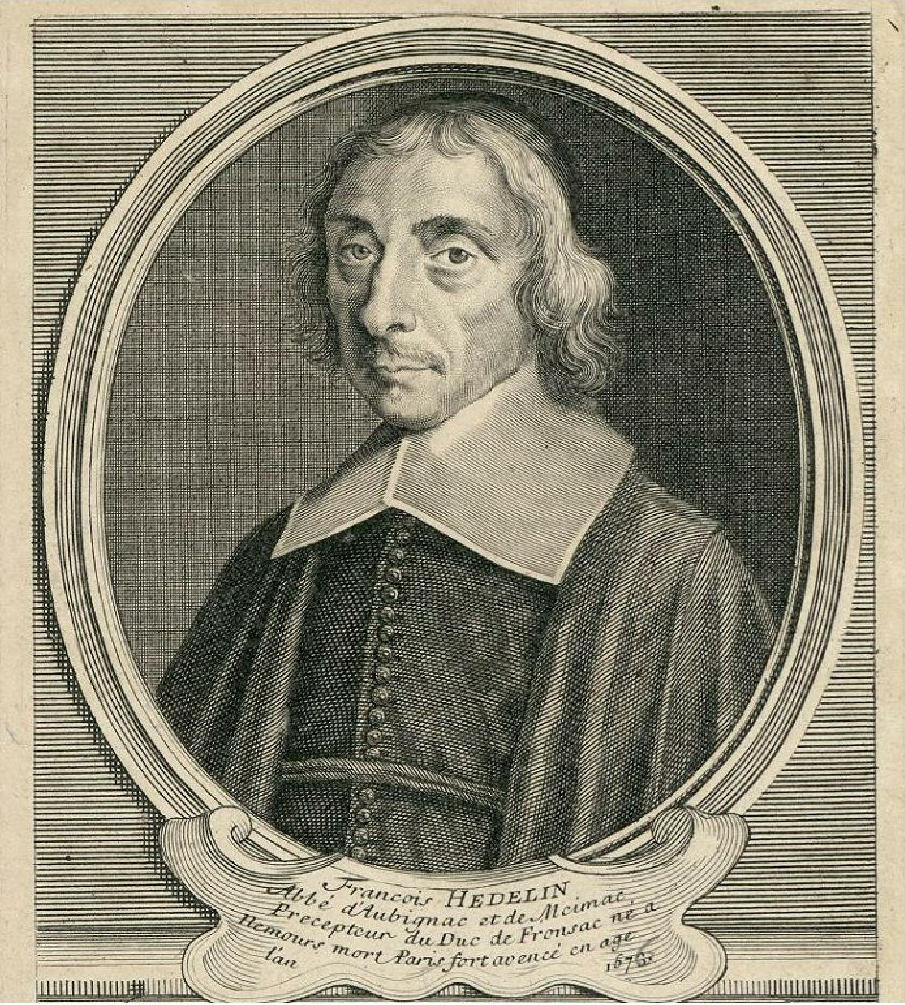François Hédelin, abbé d'Aubignac on:
[Wikipedia]
[Google]
[Amazon]
 François Hédelin, abbé d'Aubignac (4 August 1604 in Paris – 27 July 1676) was a French author and cleric.
The father of François Hédelin was Claude Hédelin, a lawyer at the Parliament, and his mother Catherine Paré, the daughter of the famous surgeon
François Hédelin, abbé d'Aubignac (4 August 1604 in Paris – 27 July 1676) was a French author and cleric.
The father of François Hédelin was Claude Hédelin, a lawyer at the Parliament, and his mother Catherine Paré, the daughter of the famous surgeon
 François Hédelin, abbé d'Aubignac (4 August 1604 in Paris – 27 July 1676) was a French author and cleric.
The father of François Hédelin was Claude Hédelin, a lawyer at the Parliament, and his mother Catherine Paré, the daughter of the famous surgeon
François Hédelin, abbé d'Aubignac (4 August 1604 in Paris – 27 July 1676) was a French author and cleric.
The father of François Hédelin was Claude Hédelin, a lawyer at the Parliament, and his mother Catherine Paré, the daughter of the famous surgeon Ambroise Paré
Ambroise Paré (c. 1510 – 20 December 1590) was a French barber surgeon who served in that role for kings Henry II, Francis II, Charles IX and Henry III. He is considered one of the fathers of surgery and modern forensic pathology and a pi ...
. After practising some time at Nemours, he abandoned law, took holy orders, and was appointed tutor to one of Richelieu's nephews, the duc de Fronsac. This patronage secured for him the abbeys of Aubignac and of Mainac. The death of the duc de Fronsac in 1646 put an end to hopes of further preferment, and the Ambroise Paréd'Aubignac retired to Nemours, occupying himself with literature till his death.
He energetically participated in the literary controversies of his time. Against Gilles Ménage
Gilles Ménage (; 15 August 1613 – 23 July 1692) was a French scholar.
Biography
He was born at Angers, the son of Guillaume Ménage, king's advocate at Angers. A good memory and enthusiasm for learning carried him quickly through his lite ...
he wrote ''Térence justifié'' (1656); he laid claim to having originated the idea of the ''Carte de tendre'' of Mlle de Scudéry's ''Clélié''; and after being a professed admirer of Corneille
Pierre Corneille (; 6 June 1606 – 1 October 1684) was a French tragedian. He is generally considered one of the three great seventeenth-century French dramatists, along with Molière and Racine.
As a young man, he earned the valuable patrona ...
, he turned against Corneille for having neglected to mention the abbé in his ''Discours sur le poème dramatique''. He was the author of four tragedies: ''La Cyminde'' (1642), ''La Pucelle d'Orléans'' (1642), ''Zénobie'' (1647) and ''Le Martyre de Sainte Catherine'' (1650). ''Zénobie'' was written with the intention of affording a model in which the strict rules of the drama, as understood by the theorists, were served.
In choosing subjects for his plays, d'Aubignac seems to have been guided by a desire to illustrate the various kinds of tragedy—patriotic, antique and religious themes. In return, the dramatic authors whom he was in the habit of criticizing were quick to take advantage of the opportunity for retaliation offered by the production of these plays.
It is as a theorist that d'Aubignac is still remembered. The credit of having been the first to play so large a part in the history of the French stage belongs to Jean Chapelain
Jean Chapelain (4 December 1595 – 22 February 1674) was a French poet and critic during the Grand Siècle, best known for his role as an organizer and founding member of the Académie française. Chapelain acquired considerable prestige as a ...
; but the laws of dramatic method and construction generally were codified by d'Aubignac in his ''Pratique du théâtre''. The book was only published in 1657, but he had begun writing it under Richelieu's urging as early as 1640.
His ''Conjectures académiques ou dissertation sur l'Iliade d'Homère'', which was not published until nearly forty years after his death, threw doubts on the existence of Homer
Homer (; grc, Ὅμηρος , ''Hómēros'') (born ) was a Greek poet who is credited as the author of the ''Iliad'' and the ''Odyssey'', two epic poems that are foundational works of ancient Greek literature. Homer is considered one of the ...
, and anticipated in some sense the conclusions of Friedrich August Wolf
Friedrich August Wolf (; 15 February 1759 – 8 August 1824) was a German classicist and is considered the founder of modern philology.
Biography
He was born in Hainrode, near Nordhausen. His father was the village schoolmaster and organi ...
in his ''Prolegomena ad Homerum'' (1795).
The contents of the '' Pratique du théâtre'' were summarized by Ferdinand Brunetière
Ferdinand Brunetière (19 July 1849 – 9 December 1906) was a French writer and critic.
Personal and public life
Early years
Brunetière was born in Toulon, Var, Provence. After school at Marseille, he studied in Paris at the Lycée Louis-le-Gr ...
in his notice of d'Aubignac in the ''Grande Encyclopédie''. See also G Saintsbury, ''Hist. of Criticism'', bk v., and Hippolyte Rigault, ''Histoire de la querelle des anciens et modernes'' (1859).
References
External links
* * {{DEFAULTSORT:Hedelin, Francois 1604 births 1676 deaths Writers from Paris 17th-century French dramatists and playwrights 17th-century French male writers